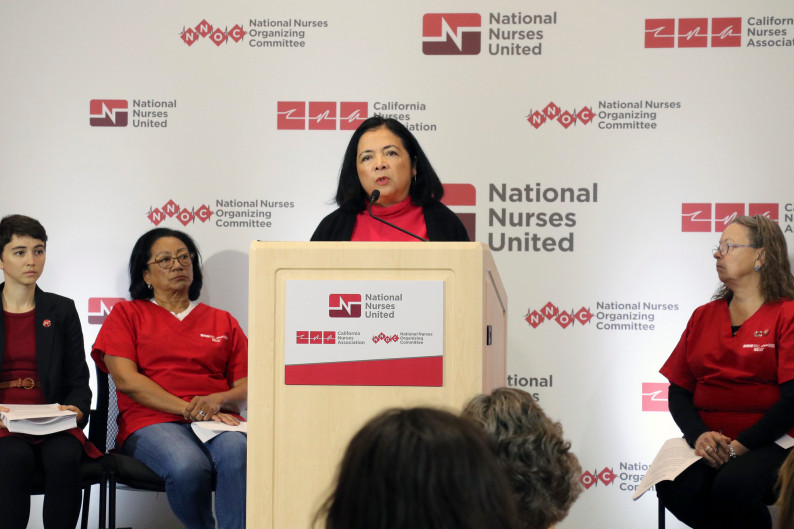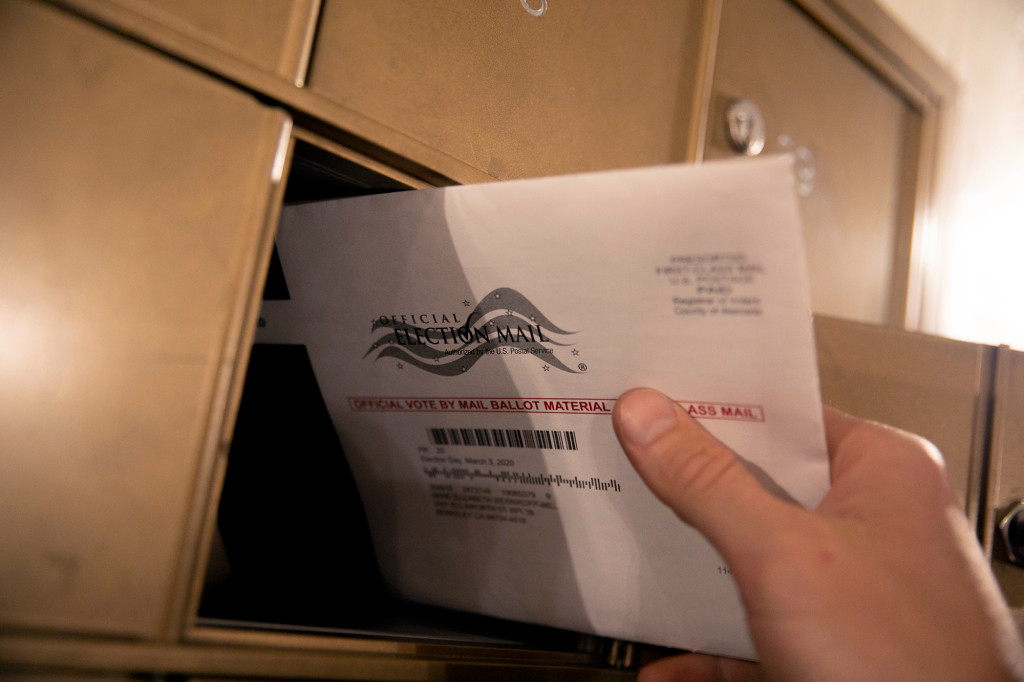Daily Business Report-March 13, 2020
Bonnie Castillo, registered nurse and executive director of National Nurses United and the California Nurses Association, presents a national survey on coronavirus preparedness on March 5, 2020. (Photo via National Nurses United)
As coronavirus toll rises,
so does health care workers’ alarm
By Ana B. Ibarra| CalMatters
When the novel coronavirus hit California, Jamille Cabacungan, a registered nurse at UCSF Medical Center, rushed to sign up as a volunteer to treat infected patients. She hesitated to answer, however, when asked recently about her preparation for that job.
The hospital is providing the necessary gear, she said, and more heightened training for some nurses. But not for all, and much of her training is coming from videos forwarded to her by the hospital, as opposed to hands-on learning-by-doing. Her colleagues are depending on her — “we don’t want to put our pregnant coworkers or those who live with elderly people at risk,” she added — but the preparation is less intense than she expected, considering the risk involved.
As California’s coronavirus strategy has moved from containment to mitigation, the health care workers on the first line of response to the epidemic are also finding themselves on the front line of potential infection. From internal conversations to calls for action from their unions, nurses, first responders and hospital staffers have sounded the alarm, raising questions about the safety protocols and spotlighting flaws and lags in response, in this state and nationally.
“Nurses are eager to take care of patients and make sure that our communities are safe, but we need the right staffing, equipment, supplies, communication and training to do this safely,” Deborah Burger, president of the National Nurses United, which represents about 150,000 nurses around the country, said during a public health roundtable earlier this week.
“Put simply if we are not protected, our patients are at risk,” Burger said.
The union has asked the state to notify nurses when patients sickened by the virus are sent to their health care facilities. They are also petitioning the state to release a full account of the protective gear in stock statewide, including respirators and information about where these respirators are stored, citing concerns over a shortage of respirators and other personal protective equipment.
The nurses, who are staging a day of protest throughout California on Wednesday, say that some of the workplace safety guidelines for states recommended by the Centers for Disease Control and Prevention are not rigorous enough to sufficiently protect health care workers and their patients.
Earlier this month, the union released a nationwide survey of 6,500 nurses in which only 29% said their hospitals had a plan in place to isolate potential coronavirus patients, and only 44% said they had gotten information from their employers about how to recognize and handle the virus.
As sick people turn up in emergency rooms, community clinics and school nurses’ offices, the workers who initially treat them run a high risk of infection. After a Vacaville hospital reported the first U.S. instance of community transmission and the patient was transferred to UC Davis Medical Center in Sacramento, for example, healthcare workers’ unions reported 124 workers were placed under quarantine. (UC Davis Medical Center later said that number was inaccurate but did not provide an estimate.) Concerns have also been raised about health care workers inadvertently spreading the virus.
Dr. Sonia Angell, director of the California Department of Public Health said her department is collaborating with all groups involved in response and checking regularly with hospitals and health care facilities to learn where their needs are.
Gov. Gavin Newsom said Tuesday that the collaboration has extended to health care workers’ unions.
“We certainly can strengthen those lines of communication but they are open lines of communication, very directly with the governor himself, ” Newsom said.
SEIU-United Healthcare Workers West, which represents nearly 150,000 workers across California, is also asking the state to help increase access to coronavirus testing for both workers and the general public. Spokesman Sean Wherley said the union also wants hospitals to make it easier to track workers sent home for possible exposure to the virus, and to provide clearer follow-up.
“They were sent home as a precaution, but not all of them were tested before they were sent home, so what about the risk posed to their families?” Wherley said.
In California and nationally, testing has been an ongoing issue. Though thousands of Californians are self-monitoring and self-quarantining, only 1,075 people have been tested in the state, with a backlog of about 200 tests, Newsom said Tuesday. Commercial labs are supposed to help relieve some of that load.
Workforce shortage is also a concern. “If each positive patient results in five to ten workers being sent home, how many times can that happen before you have a staffing crisis?” Wherley said.
The California Hospital Association said healthcare staffing hasn’t become an issue at this point, “but it is certainly something everybody has to be cognizant of,” said Jan Emerson-Shea, spokesperson for the group.
“The discussion has moved from containment to accepting the fact that this virus is here, so there is certainly some concern about how it will affect staff and the ability to continue operating,” she said.
Newsom’s emergency declaration earlier this month on coronavirus allows health care workers to come from out of state to fill any gaps should California experience a crisis in staffing. Still, state lawmakers — the majority of whom, like Newsom, were elected with the support of organized labor — have been sensitive to health care workplace concerns.
“Making sure we protect health care workers is extremely critical because we depend on these very same health care workers to take care of the patients who may end up in the hospital,” said Sen. Richard Pan, chair of the Senate Health Committee. “If there are any resources [state public health officials] need, the Legislature would want to make sure they have those resources.”
CalMatters.org is a nonprofit, nonpartisan media venture explaining California policies and politics.
_________________________
Seismic named one of Forbes’
Best Startup Employers 2020
San Diego-based Seismic, the maker of sales enablement software, has been recognized in Forbes’ inaugural list of America’s Best Startup Employers 2020. This award is presented by Forbes and Statista Inc., the world-leading statistics portal and industry ranking provider.
Forbes and Statista analyzed more than seven million data points to identify the top 500 startup employers. In particular, three aspects of each company were assessed during the evaluation: employer reputation, employee satisfaction, and company growth.
Seismic’s recognition by Forbes as a Best Startup Employer of 2020 follows a year of “best company” awards. This includes the San Diego Business Journal Best Places to Work, the San Diego Union-Tribune Top Workplaces, the Boston Business Journal Best Places to Work, and more. Seismic was also recognized by Comparably, which is based on employee reviews, with a Best Company Culture honor in the “small-to-midsize U.S. companies” category.
“Seismic is only as good as its people – our employees, working closely with our customers, are truly what drive our success,” said Doug Winter, CEO and co-founder of Seismic.
_________________________
Proposition 13 is dead
by Emily Hoeven | CALmatters
Proposition 13 is officially dead — the 2020 version, that is.
The campaign for the $15 billion school construction bond conceded defeat Wednesday as the measure trailed with 46 percent of the vote, CalMatters education reporter Ricardo Cano writes.
Prop. 13 is the first state school bond to fail in over 20 years, during which time California voters passed five school bonds totaling $45 billion.
One possible reason: It shared the same name as the iconic 1978 measure that capped property taxes.
Also possible: Voters are simply tired of taxes and bonds.
Still unclear: Whether the Legislature will try again with a modified school bond on the Nov. 3 ballot. Lawmakers have until June 25 to decide.
Meanwhile: Assemblyman Patrick O’Donnell, the Long Beach Democrat who authored the Prop. 13 legislation, introduced a bill this week to formally retire the number 13 as a designation and minimize voter confusion.
_________________________
Californians receive invitations
to participate in 2020 Census
Californians started receiving invitations to participate in the 2020 Census from the U.S. Census Bureau on Thursday. This marks the official beginning of the historic count that will determine the distribution of billions of dollars in federal funding and state and political representation in the next decade.
Every Californian can now respond to the Census online at https://2020census.gov.
California’s Census outreach and media campaign is led by the California Complete Count – Census 2020 Office and comprised of hundreds of regional and statewide partners. The state’s comprehensive outreach and multi-media campaign encourages all Californians to participate in the Census as soon as possible and provides them with culturally sensitive and in-language support.
“Seeing the first invitations arrive in California is an exciting and critically important moment. Beginning today, Californians have the power to shape our state’s future for the next decade.” said Ditas Katague, Director of the California Complete Count – Census 2020 Office. “The Census form is nine easy questions and your responses are protected by law. We need ALL Californians to complete their form so we can ensure representation and resources stay home.”
_________________________
Salk Institute cancels all public events
on campus through the end of March
Due to the unfolding novel coronavirus (COVID-19) spread, all public events scheduled to be held on the Salk campus through the end of March have been canceled or postponed to protect the health of Salk employees, visitors and the community. The Institute campus has also closed to the public and canceled tours. The Institute is continuing to monitor advice by the Centers for Disease Control and Prevention as well as local public health organizations.
_________________________
What California got from its
settlement with T-Mobile
California reached a settlement with T-Mobile over its $26 billion merger with Sprint, Attorney General Xavier Becerra said. Becerra sued T-Mobile in 2019, arguing the merger would drive up prices and stifle competition.
Here are a few key things Californians can expect from the merger:
- Free Internet service for five years for 10 million low-income families currently without Internet.
- Low-cost plans for five years, including a $15/month, 2-gigabyte data plan and a $25/month, 5-gigabyte data plan.
- The creation of a customer service center in Kingsburg, Fresno County, that will employ around 1,000 people.
— CALmatters




